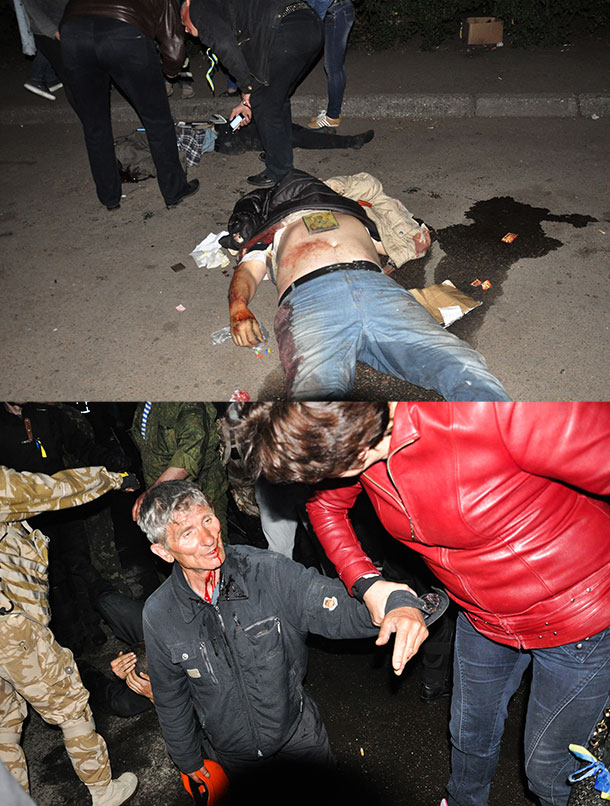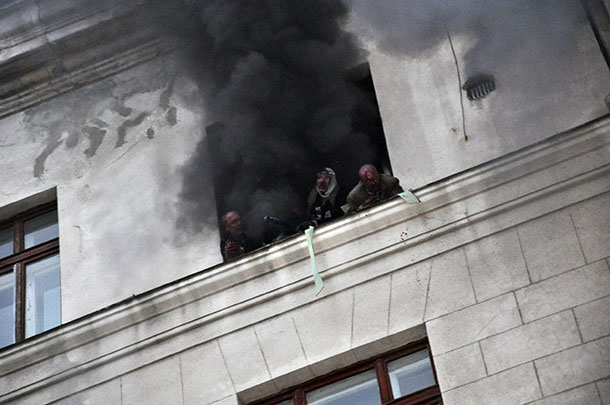2 November 2014 Edition
Ukraine – Odessa massacre survivor talks to An Phoblacht
48 died in Ukraine trade union hall torched by neo-Nazis

• Scenes from the attack on the Trade Unions House in Odessa by far-Right gangs
IN MAY of this year, a right-wing gang burned 48 people to death at a trade union building in the southern Ukrainian city of Odessa at the height of the Ukraine crisis.
President Viktor Yanukovych, seen as being close to Russia, had been forced from office by the so-called Euromaidan protest movement and replaced with an unelected pro-EU official.
In Dublin, six months later, Ukrainian organisation Mobius hosted a photo exhibition dealing with the attack in Odessa and the ongoing war in Donbass. Speaking at the opening of the exhibition, Irish Congress of Trade Unions President John Douglas said:
“Workers everywhere should know the real truth and should support their comrades in Ukraine. Our Foreign Affairs Minister needs get involved and call for an immediate international inquiry into what happened on 2 May when innocent trade unionists, progressive thinkers and politicians were herded into a building and burned to death, and bludgeoned as they tried to escape.”
One of those at the Dublin event is Julie. A student, she is also one of only a handful of people who survived the attack on the trade union building. Out of concern for her parents’ safety she has asked that we do not disclose her full name.
Julie was in Odessa visiting her parents after her studies when rumours circulated of a fight in the city centre between rival demonstrators. Locals said there were many people wounded but Ukrainian TV, now under the control of the unelected regime, had no reports.
“Me and my sister decided to go into the city to find out what was going on,” she tells An Phoblacht.
“My sister is a doctor so we brought some medical supplies and went in to see if anybody needed help. We just didn’t realise how bad the violence was.”
In Odessa city centre, clashes had broken out between rival pro- and anti-government protesters.
“When we got to the city centre there was gangs of really aggressive young guys chanting things like ‘Death to Russians!’ and really extreme nationalist slogans. We got a call from a girl in Kulikovo Square telling us there were people injured there so we headed towards it.”

Kulikovo Square had been the site of a large protest camp by those opposed to the overthrow of the President by pro-EU activists. Many of those there also expressed their solidarity with the pro-Russia rebels in the east of the country who had declared independence from Kiev.
When they arrived, Julie’s sister began applying bandages to an injured man in the square while Julie went into the trade union building.
“I asked where the medical volunteers were and was told they were inside Trade Unions House. The door had been broken down as the building was usually closed. I went to the second floor and I saw two volunteer nurses wearing red crosses and gave them the medical supplies. As I was walking down the stairs back out to my sister I just heard lots of people screaming ‘Everybody inside!’”
Thousands of pro-Kiev protesters, including members of the neo-Nazi Right Sector organisation were heading towards the protest camp.
“There was a flood of people through the doors. I didn’t know what was going on. My sister came in and she grabbed me by the hand and said ‘We need to go.’ We were the only two who decided to leave the building. It was difficult to get out because everybody was still pouring in. When we were outside we ran towards a nearby park. I turned and saw huge numbers of people, many carrying baseball bats, descending on the square.
“We saw five police officers near the building and screamed and pleaded with them to do something. We told them there were women and elderly people inside. They just ignored us. As we crossed the bridge over the railway we saw the building go up in flames.”
Her voice cracks and tears well up in her eyes.
“The people we had seen only a few minutes ago were still inside.”
Dozens of people were killed in the blaze. Others were beaten to death by Right Sector thugs after they jumped from windows trying to escape. In total, 48 people died that day; 50 others from the city are still missing.
Julie criticises the police for failing to carry out any type of real investigation. She says she believes they have no interest in catching those responsible. Six months on, there is still immense fear on the streets.
“People are terrified to speak about the political situation over the phone or online. The repression is immense.
“What happened in Odessa was a pure massacre. I hope people will think more about the situation in Ukraine. The only thing I feel I can do for the people who died and for those still living in fear is to speak out about it.
“European politicians need to wake up and stop supporting these extremely nationalistic, and in some cases fascist, movements in Ukraine.”




